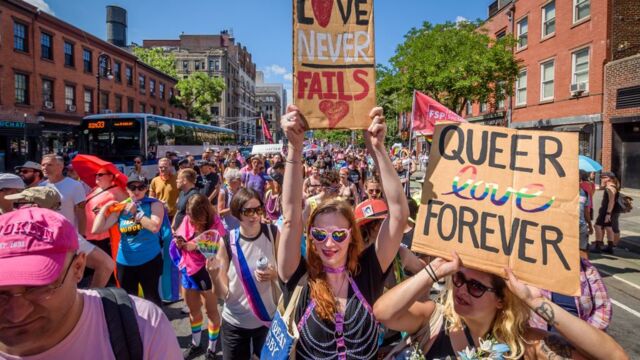In recent years, the term non-binary has gained a lot of traction, but not without leaving many people confused. This is because non-binary tackles the Western gender binary, which insists there are only two genders, male and female, and that society must be separated into masculine and feminine categories. Despite the fact that this theory is often contested by scientists and scholars, society has run with it since its inception.
Discover our latest podcast
Because of this, people are beginning to view gender identities as being part of a ‘spectrum,’ as opposed to being a binary. As a result, this has allowed people the freedom to identify and present themselves however they deem fit.
But what does non-binary mean?
Put simply, people that identify as non-binary do not abide by the gender binary. This shortsighted binary is reinforced by society, normalising the division of men and women, and shunning anyone that doesn’t identify with the mainstream, narrow definitions of ‘male’ and ‘female.’ The word itself is an umbrella term, which refers to anyone that does not exclusively identify with one gender, either finding themselves identifying with a mix of genders or none at all.
There is no specific type of presentation non-binary people have to conform to—in fact, many non-binary people describe their gender as fluid, allowing them to embrace aspects of the masculine and feminine as they please.

A brief history
Many people think that being non-binary is something new, even though it has been around for ages. The earliest written records of non-binary people actually date back to the 2nd millennium BCE—Mesopotamian mythology references people who are neither female nor male.
On top of that, there are many cultures that embrace this ideology, including Hawaiian and Indigenous cultures. Māhū refers to third-gender persons in Hawaiian and Tahitian cultures who don’t identify as either male or female. Similarly, in Indigenous cultures, two-spirit is used as an umbrella term to describe Native people that fulfil gender-variant roles in their cultures. These people are often revered, as they hold important social and ceremonial positions in their cultures and community.
Fluid gender roles and identities have existed outside the binary for centuries. Even though ‘male’ and ‘female’ labels have been the standard in Western society for so long, that should never overshadow the fact that history is rampant with genderless figures.

So where are we now?
Acceptance is on the horizon with the combined efforts of the LGBTQ+ community and allies alike. While the gender binary is still ever-present in many aspects of our life—whether it be clothing sections at the store or common phrases like, 'women belong in the kitchen—' that doesn’t discredit the fact that many companies and notable figures are aiding in the fight for equal representation and validation.
Genderless bathrooms are popping up more and more, unisex clothing sections are rising, and our modern language is becoming more inclusive all the time. On July 14, 2012, the very first International Non-Binary People's Day, created by Katje van Loon, was officially celebrated. More policies are being put in place to validate and protect those with genderless identities, and many countries are allowing people to legally identify as gender-neutral, often using 'X' as a label.
Important figures
During the 1910s, German sexologist Magnus Hirschfield opened the first clinic to regularly serve transgender people. His institute contained a library full of literature about LGBTQ+ people, which helped revolutionise people’s understanding of identities. In fact, this changing mindset allowed children to express themselves as gender non-conforming. Unfortunately, in 1933, the Nazis destroyed the library and LGBTQ+ rights were set back decades. By recognising his efforts, we’re able to recognise how the fight for equality and gender representation aren’t new concepts, but rather an ongoing battle lasting thousands of years.
Nowadays, many celebrities and public figures identify as non-binary. This list includes the familiar faces of Jonathan Van Ness, Amandla Stenberg, Brigette Lundy-Paine, Arca, and Cara Delevingne. Many of these people have come out just recently, fearing the stigma surrounding their gender identity. In their coming out posts, they often share this fear, while also expressing how freeing and relieving it is to finally show their true selves to the world. By being transparent about their identities, these figures can encourage people to embrace their own, or even give them the freedom to explore.

So how do I help support non-binary people?
- Respect people’s pronouns. The easiest way to validate someone’s identity is to respect their pronouns, and only call them the pronouns they wish to be referred by. Some people choose various pronouns for a multitude of reasons, and it’s completely fine to relate with multiple identities. If someone you know has multiple pronouns, try mixing them up in conversation! It can help that person feel more secure.
- Stay away from gender binary stereotypes. Everyone has had experience with the division of 'women' vs 'men,' and one of the terrible by-products of it is frequent stereotyping. By shedding yourself of the belief that there are designated items, jobs, roles, clothing, etc. for men and women, you’re choosing to ignore society’s prejudiced standards and motivating others to do the same.
- Support brands that support non-binary people. Whether this means supporting brands led by non-binary people or brands designed for non-binary people is your choice. Uplifting these business and business owners can create a domino effect that inspires others to cater more to genderless people. Some great brands that do this include NOTO Botanics, Tomboy X, and 69 Worldwide.















